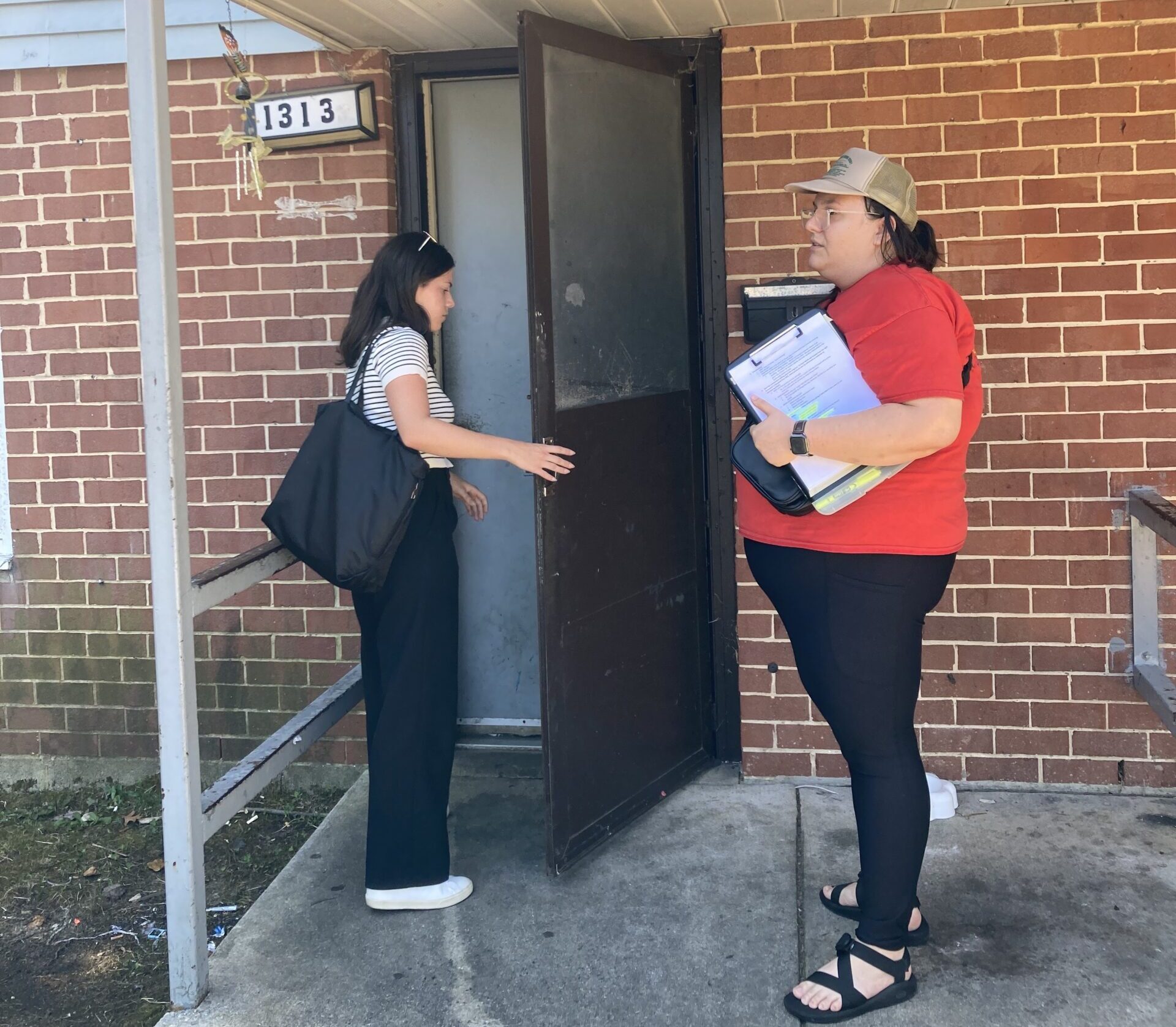ANNAPOLIS, Md. — Rita Wilkerson waited three years for the Housing Authority of the City of Annapolis to fix her leaking sink.
The Robinwood complex resident stocks up on mouse traps and Clorox wipes to cope with a rodent problem that leaves her stove and dining room table littered with droppings.
Sun-bleached notices from February 2022, November 2022 and February 2023 on her door testify to multiple visits from the City of Annapolis when her unit failed inspection, placing HACA’s license to lease the unit into an uncertain status.
“I know I’m not the only one,” said Wilkerson, 43, a registered nurse living in the public housing community. “I’m not the only one here having these problems with this place.”
Representatives from Maryland Legal Aid and Community Legal Services knocked on 30 doors in Robinwood Thursday to let residents know that they have more rights in disputes with landlords than they might think.

Outreach is the latest phase in implementation of a 2021 state law establishing the right to free legal representation for low-income tenants facing eviction in Maryland.
The law covers tenants in households earning up to half the state’s median income, or about $64,000 for a family of four, who are threatened with eviction. But attorneys and organizers emphasized that help is available for tenants before the process progresses that far.
“It has the potential to really change the way that tenants – and just Marylanders – think about eviction, because it sort of works to level the playing field,” said Amanda Wisniewski, a Maryland Legal Aid organizing fellow who knocked on doors in Robinwood.
“My advice to people is always, ‘When in doubt, call,’” Wisniewski said.
The program established by the law has funded legal aid organizations to hire attorneys and community groups to urge tenants to seek out legal aid when they face eviction.
Reena Shah, chair of Maryland’s Access to Counsel in Evictions Task Force, said the program aims to connect qualifying tenants with attorneys before they arrive in court.
Matt Hill, team leader of the Human Right to Housing Project at the Public Justice Center, said attorneys can develop a better defense when they speak with tenants before the day of a court appearance, when the renters and lawyer might only have 20 minutes before their hearing begins.
“We’re still getting most of our clients when we make an announcement at court right before the docket starts saying, ‘Hey, there’s lawyers here who may be able to assist you,’” Hill said. “And then it’s a mad dash.”
Attorneys and tenants can ask judges to postpone proceedings. But it’s up to judges to decide.
A postponement, or continuance, gives tenants a chance to find a lawyer if they could not do so before their initial court date, according to Shirley Gordon, president of the Clay Street Community Development Corporation in Annapolis.
“I’m not going to say not go to court, but I’m going to say get a continuance until you can get legal representation,” Gordon said.
Zafar Shah, assistant director of advocacy for Maryland Legal Aid, who is not related to Reena Shah, called for reforms so that tenants have a fair chance to fight eviction filings.
“If our success is only sustained by relationships and personalities, then we’re not going to create the kind of systemic reform of evictions in Maryland that was actually envisioned and what motivated the law,” Zafar Shah said.
A 2022 bill guaranteeing a postponement of at least five business days to allow tenants to seek legal aid died in a House committee. Current law authorizes but does not require a judge to adjourn an eviction trial for up to one day, or longer with all parties’ consent.
Tenants not facing eviction, even though they are facing other housing problems, are not covered by the law, he and others said.
“It’s a little bit of smoke and mirrors, in some ways, legally to say you have a right to counsel, but it’s only to defend against a certain type of proceeding,” Zafar Shah said.
Groups doing outreach are letting tenants know that attorneys can help with problems besides eviction, however that help is not funded under this program.
One of them, United Workers, was selected to do outreach in Baltimore about tenants’ right to counsel in evictions. But Todd Cherkis, United Workers’ co-director of base-building and leadership development, said the group aims to help tenants with an array of housing issues in Baltimore as well as Cumberland, Hagerstown and Westminster.
“The best is for people to have questions, to have concerns,” Cherkis said. “Maybe they’re behind on rent, or maybe they have a maintenance question. Or maybe they’re just confused about a landlord practice. This is an opportunity to be in touch with an attorney, a seasoned veteran of these issues that can inform tenants of what their rights are.”


You must be logged in to post a comment.